Adult Mental Health Services: Comprehensive Consumer Assessment Report
VerifiedAdded on 2023/06/04
|9
|1974
|421
Report
AI Summary
This report presents a Mental State Examination (MSE) and consumer assessment of a 14-year-old male patient, Harry, focusing on his mental health status. The assessment covers various aspects, including general appearance, behavior, speech, mood, affect, thought process, thought content, perception, cognition, judgment, and insight. Harry exhibits signs of substance abuse, delusional thoughts (believing he has superpowers and can become invisible), and destructive ideation towards his brother. The report details the patient's mental state, identifies symptoms, and proposes interventions such as counseling, substance abuse rehabilitation, and medication to manage aggressive behavior and sleep disturbances. A nursing report is also included, summarizing the patient's condition, assessment findings, and recommended interventions, emphasizing the need for immediate action to prevent further deterioration of his mental health. The report concludes with references to relevant literature supporting the assessment and proposed interventions.
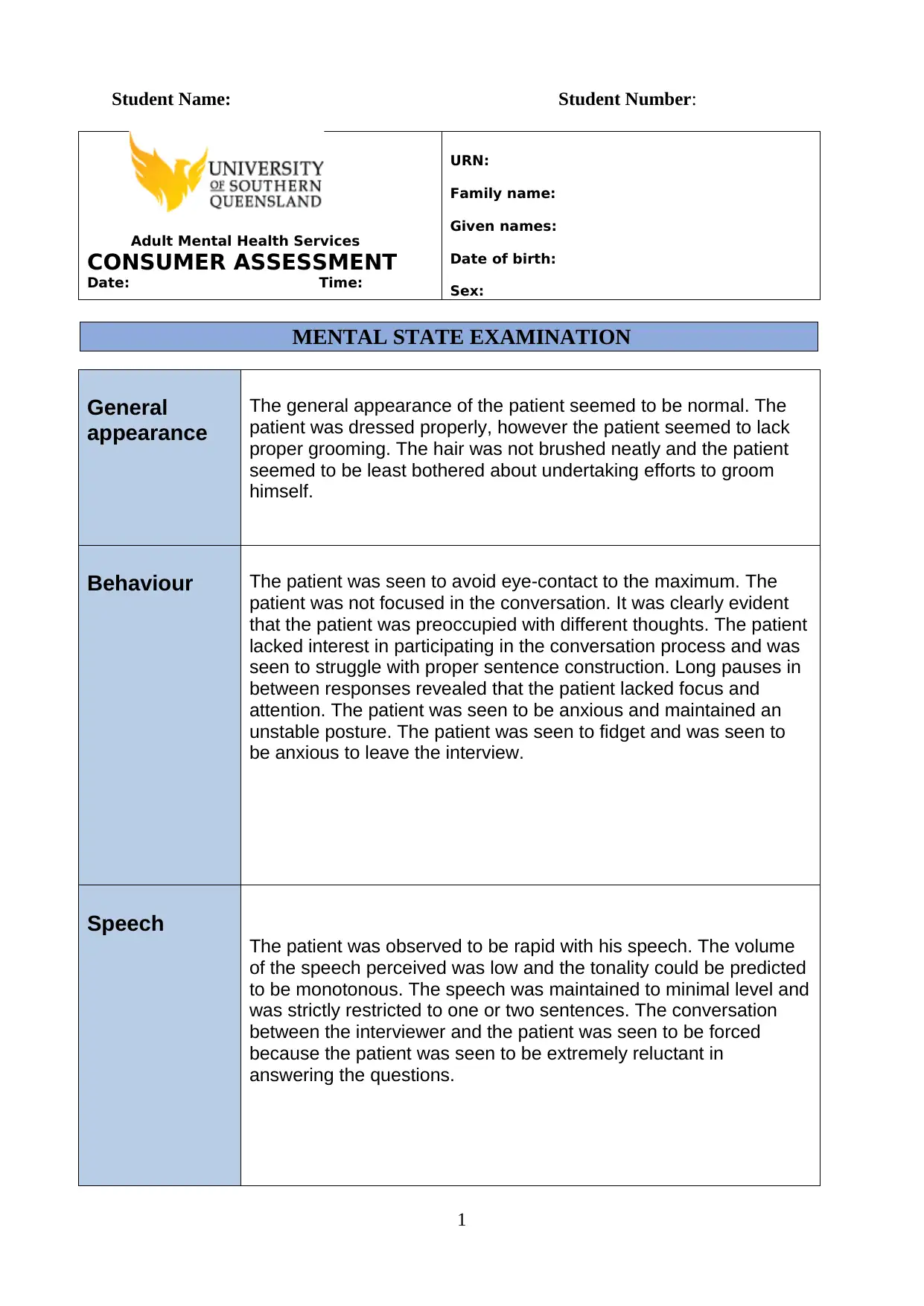
Student Name: Student Number:
Adult Mental Health Services
CONSUMER ASSESSMENT
Date: Time:
URN:
Family name:
Given names:
Date of birth:
Sex:
MENTAL STATE EXAMINATION
General
appearance
The general appearance of the patient seemed to be normal. The
patient was dressed properly, however the patient seemed to lack
proper grooming. The hair was not brushed neatly and the patient
seemed to be least bothered about undertaking efforts to groom
himself.
Behaviour The patient was seen to avoid eye-contact to the maximum. The
patient was not focused in the conversation. It was clearly evident
that the patient was preoccupied with different thoughts. The patient
lacked interest in participating in the conversation process and was
seen to struggle with proper sentence construction. Long pauses in
between responses revealed that the patient lacked focus and
attention. The patient was seen to be anxious and maintained an
unstable posture. The patient was seen to fidget and was seen to
be anxious to leave the interview.
Speech
The patient was observed to be rapid with his speech. The volume
of the speech perceived was low and the tonality could be predicted
to be monotonous. The speech was maintained to minimal level and
was strictly restricted to one or two sentences. The conversation
between the interviewer and the patient was seen to be forced
because the patient was seen to be extremely reluctant in
answering the questions.
1
Adult Mental Health Services
CONSUMER ASSESSMENT
Date: Time:
URN:
Family name:
Given names:
Date of birth:
Sex:
MENTAL STATE EXAMINATION
General
appearance
The general appearance of the patient seemed to be normal. The
patient was dressed properly, however the patient seemed to lack
proper grooming. The hair was not brushed neatly and the patient
seemed to be least bothered about undertaking efforts to groom
himself.
Behaviour The patient was seen to avoid eye-contact to the maximum. The
patient was not focused in the conversation. It was clearly evident
that the patient was preoccupied with different thoughts. The patient
lacked interest in participating in the conversation process and was
seen to struggle with proper sentence construction. Long pauses in
between responses revealed that the patient lacked focus and
attention. The patient was seen to be anxious and maintained an
unstable posture. The patient was seen to fidget and was seen to
be anxious to leave the interview.
Speech
The patient was observed to be rapid with his speech. The volume
of the speech perceived was low and the tonality could be predicted
to be monotonous. The speech was maintained to minimal level and
was strictly restricted to one or two sentences. The conversation
between the interviewer and the patient was seen to be forced
because the patient was seen to be extremely reluctant in
answering the questions.
1
Paraphrase This Document
Need a fresh take? Get an instant paraphrase of this document with our AI Paraphraser
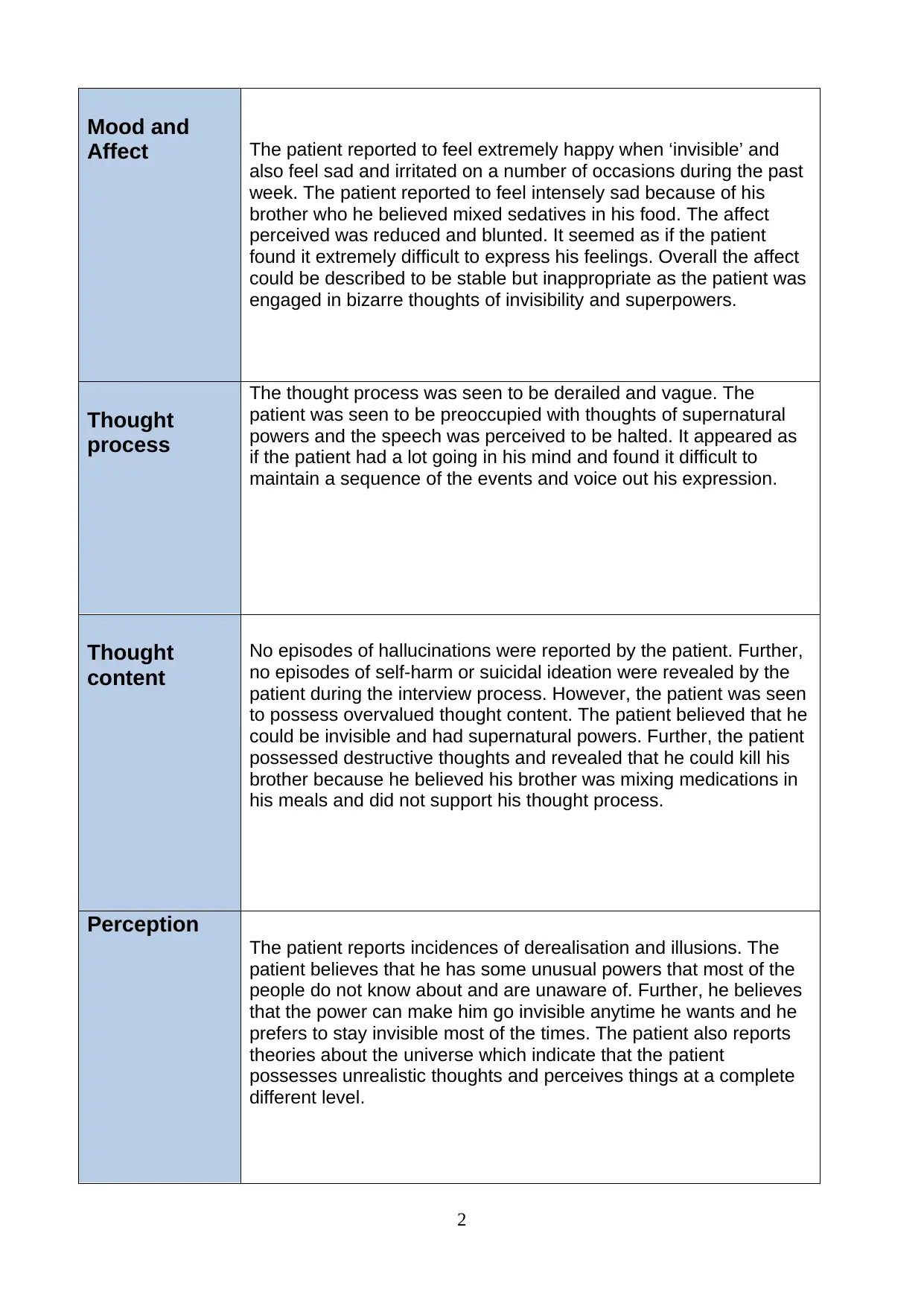
Mood and
Affect The patient reported to feel extremely happy when ‘invisible’ and
also feel sad and irritated on a number of occasions during the past
week. The patient reported to feel intensely sad because of his
brother who he believed mixed sedatives in his food. The affect
perceived was reduced and blunted. It seemed as if the patient
found it extremely difficult to express his feelings. Overall the affect
could be described to be stable but inappropriate as the patient was
engaged in bizarre thoughts of invisibility and superpowers.
Thought
process
The thought process was seen to be derailed and vague. The
patient was seen to be preoccupied with thoughts of supernatural
powers and the speech was perceived to be halted. It appeared as
if the patient had a lot going in his mind and found it difficult to
maintain a sequence of the events and voice out his expression.
Thought
content
No episodes of hallucinations were reported by the patient. Further,
no episodes of self-harm or suicidal ideation were revealed by the
patient during the interview process. However, the patient was seen
to possess overvalued thought content. The patient believed that he
could be invisible and had supernatural powers. Further, the patient
possessed destructive thoughts and revealed that he could kill his
brother because he believed his brother was mixing medications in
his meals and did not support his thought process.
Perception
The patient reports incidences of derealisation and illusions. The
patient believes that he has some unusual powers that most of the
people do not know about and are unaware of. Further, he believes
that the power can make him go invisible anytime he wants and he
prefers to stay invisible most of the times. The patient also reports
theories about the universe which indicate that the patient
possesses unrealistic thoughts and perceives things at a complete
different level.
2
Affect The patient reported to feel extremely happy when ‘invisible’ and
also feel sad and irritated on a number of occasions during the past
week. The patient reported to feel intensely sad because of his
brother who he believed mixed sedatives in his food. The affect
perceived was reduced and blunted. It seemed as if the patient
found it extremely difficult to express his feelings. Overall the affect
could be described to be stable but inappropriate as the patient was
engaged in bizarre thoughts of invisibility and superpowers.
Thought
process
The thought process was seen to be derailed and vague. The
patient was seen to be preoccupied with thoughts of supernatural
powers and the speech was perceived to be halted. It appeared as
if the patient had a lot going in his mind and found it difficult to
maintain a sequence of the events and voice out his expression.
Thought
content
No episodes of hallucinations were reported by the patient. Further,
no episodes of self-harm or suicidal ideation were revealed by the
patient during the interview process. However, the patient was seen
to possess overvalued thought content. The patient believed that he
could be invisible and had supernatural powers. Further, the patient
possessed destructive thoughts and revealed that he could kill his
brother because he believed his brother was mixing medications in
his meals and did not support his thought process.
Perception
The patient reports incidences of derealisation and illusions. The
patient believes that he has some unusual powers that most of the
people do not know about and are unaware of. Further, he believes
that the power can make him go invisible anytime he wants and he
prefers to stay invisible most of the times. The patient also reports
theories about the universe which indicate that the patient
possesses unrealistic thoughts and perceives things at a complete
different level.
2
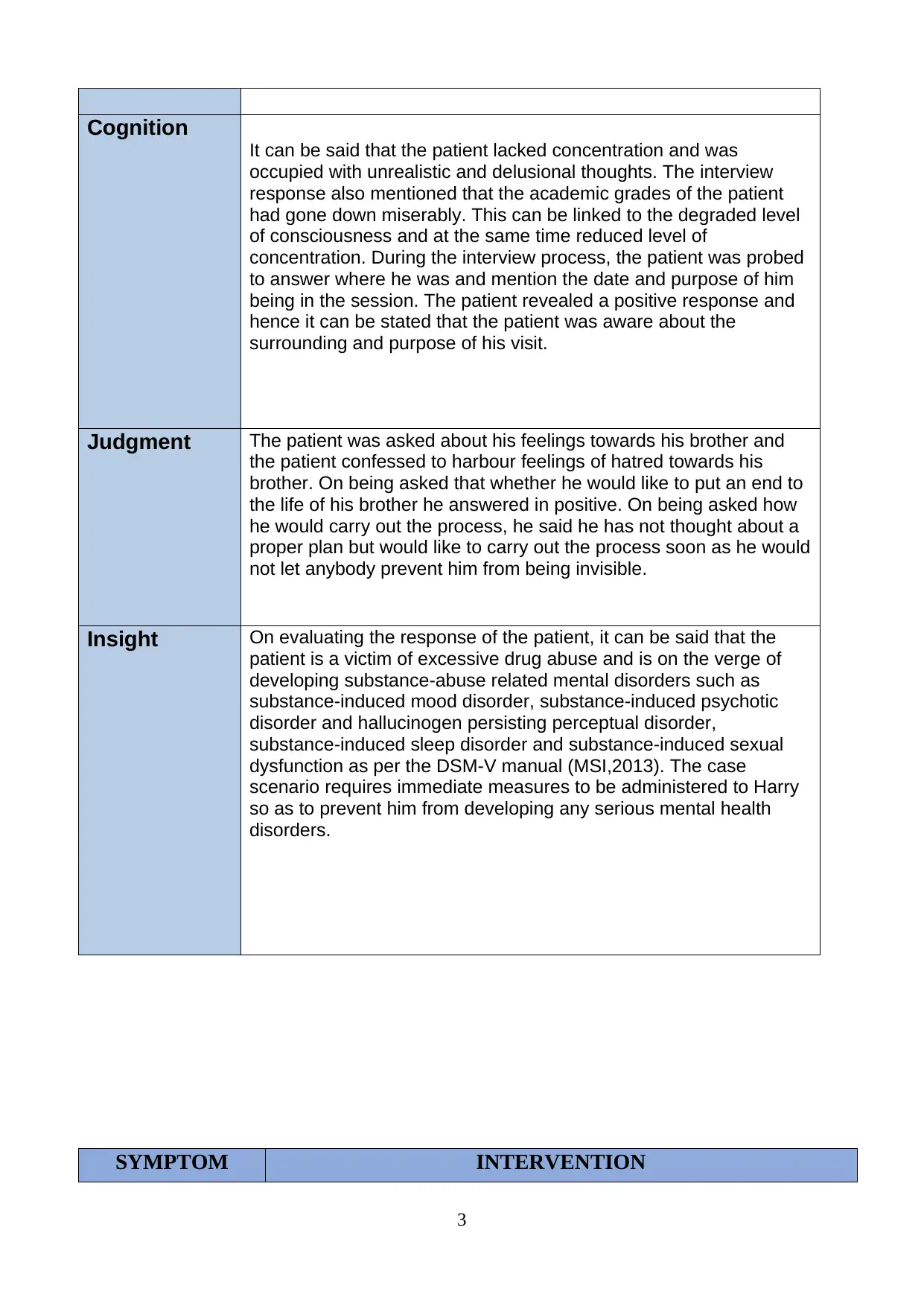
Cognition
It can be said that the patient lacked concentration and was
occupied with unrealistic and delusional thoughts. The interview
response also mentioned that the academic grades of the patient
had gone down miserably. This can be linked to the degraded level
of consciousness and at the same time reduced level of
concentration. During the interview process, the patient was probed
to answer where he was and mention the date and purpose of him
being in the session. The patient revealed a positive response and
hence it can be stated that the patient was aware about the
surrounding and purpose of his visit.
Judgment The patient was asked about his feelings towards his brother and
the patient confessed to harbour feelings of hatred towards his
brother. On being asked that whether he would like to put an end to
the life of his brother he answered in positive. On being asked how
he would carry out the process, he said he has not thought about a
proper plan but would like to carry out the process soon as he would
not let anybody prevent him from being invisible.
Insight On evaluating the response of the patient, it can be said that the
patient is a victim of excessive drug abuse and is on the verge of
developing substance-abuse related mental disorders such as
substance-induced mood disorder, substance-induced psychotic
disorder and hallucinogen persisting perceptual disorder,
substance-induced sleep disorder and substance-induced sexual
dysfunction as per the DSM-V manual (MSI,2013). The case
scenario requires immediate measures to be administered to Harry
so as to prevent him from developing any serious mental health
disorders.
SYMPTOM INTERVENTION
3
It can be said that the patient lacked concentration and was
occupied with unrealistic and delusional thoughts. The interview
response also mentioned that the academic grades of the patient
had gone down miserably. This can be linked to the degraded level
of consciousness and at the same time reduced level of
concentration. During the interview process, the patient was probed
to answer where he was and mention the date and purpose of him
being in the session. The patient revealed a positive response and
hence it can be stated that the patient was aware about the
surrounding and purpose of his visit.
Judgment The patient was asked about his feelings towards his brother and
the patient confessed to harbour feelings of hatred towards his
brother. On being asked that whether he would like to put an end to
the life of his brother he answered in positive. On being asked how
he would carry out the process, he said he has not thought about a
proper plan but would like to carry out the process soon as he would
not let anybody prevent him from being invisible.
Insight On evaluating the response of the patient, it can be said that the
patient is a victim of excessive drug abuse and is on the verge of
developing substance-abuse related mental disorders such as
substance-induced mood disorder, substance-induced psychotic
disorder and hallucinogen persisting perceptual disorder,
substance-induced sleep disorder and substance-induced sexual
dysfunction as per the DSM-V manual (MSI,2013). The case
scenario requires immediate measures to be administered to Harry
so as to prevent him from developing any serious mental health
disorders.
SYMPTOM INTERVENTION
3
⊘ This is a preview!⊘
Do you want full access?
Subscribe today to unlock all pages.

Trusted by 1+ million students worldwide
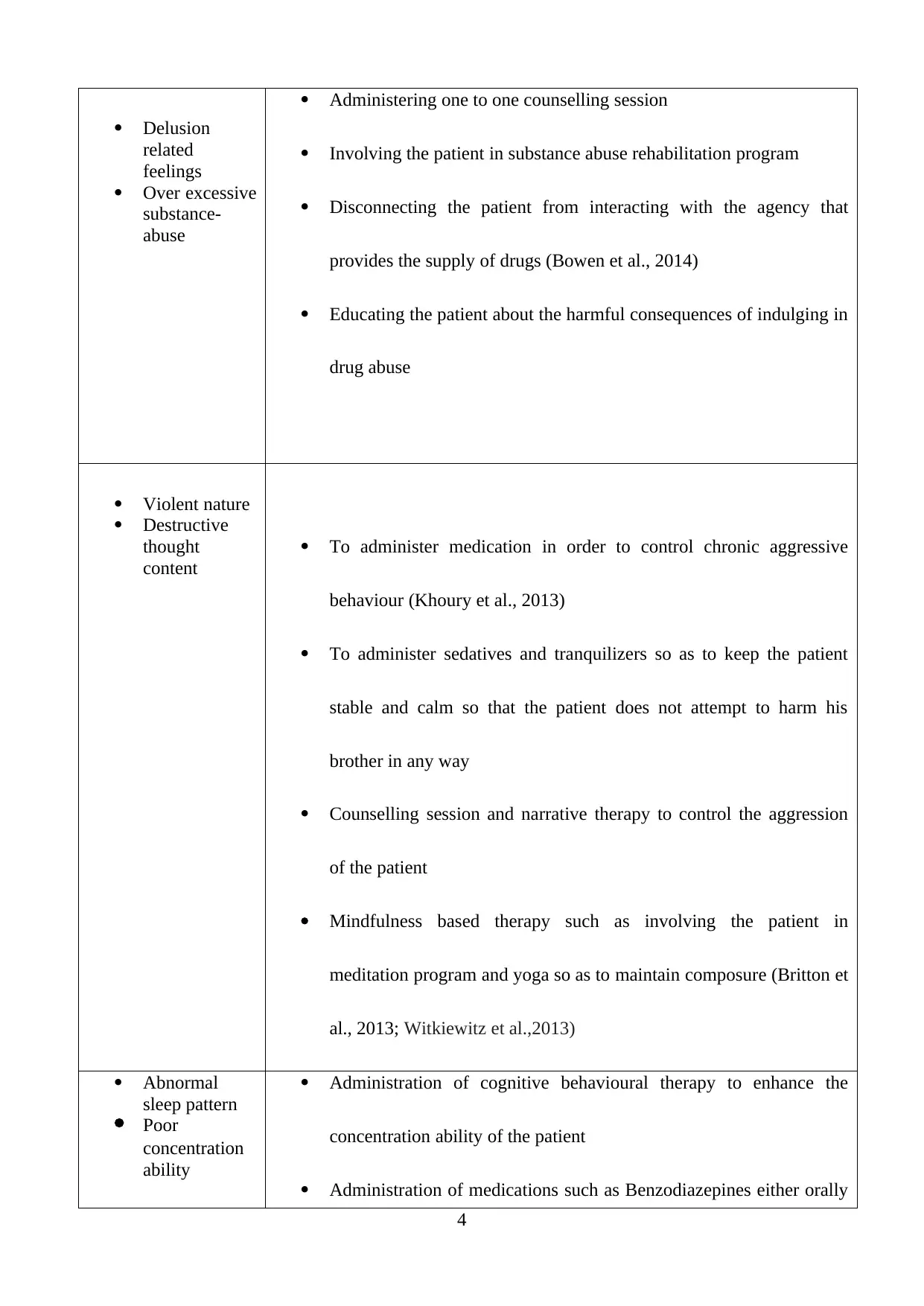
Delusion
related
feelings
Over excessive
substance-
abuse
Administering one to one counselling session
Involving the patient in substance abuse rehabilitation program
Disconnecting the patient from interacting with the agency that
provides the supply of drugs (Bowen et al., 2014)
Educating the patient about the harmful consequences of indulging in
drug abuse
Violent nature
Destructive
thought
content
To administer medication in order to control chronic aggressive
behaviour (Khoury et al., 2013)
To administer sedatives and tranquilizers so as to keep the patient
stable and calm so that the patient does not attempt to harm his
brother in any way
Counselling session and narrative therapy to control the aggression
of the patient
Mindfulness based therapy such as involving the patient in
meditation program and yoga so as to maintain composure (Britton et
al., 2013; Witkiewitz et al.,2013)
Abnormal
sleep pattern
Poor
concentration
ability
Administration of cognitive behavioural therapy to enhance the
concentration ability of the patient
Administration of medications such as Benzodiazepines either orally
4
related
feelings
Over excessive
substance-
abuse
Administering one to one counselling session
Involving the patient in substance abuse rehabilitation program
Disconnecting the patient from interacting with the agency that
provides the supply of drugs (Bowen et al., 2014)
Educating the patient about the harmful consequences of indulging in
drug abuse
Violent nature
Destructive
thought
content
To administer medication in order to control chronic aggressive
behaviour (Khoury et al., 2013)
To administer sedatives and tranquilizers so as to keep the patient
stable and calm so that the patient does not attempt to harm his
brother in any way
Counselling session and narrative therapy to control the aggression
of the patient
Mindfulness based therapy such as involving the patient in
meditation program and yoga so as to maintain composure (Britton et
al., 2013; Witkiewitz et al.,2013)
Abnormal
sleep pattern
Poor
concentration
ability
Administration of cognitive behavioural therapy to enhance the
concentration ability of the patient
Administration of medications such as Benzodiazepines either orally
4
Paraphrase This Document
Need a fresh take? Get an instant paraphrase of this document with our AI Paraphraser
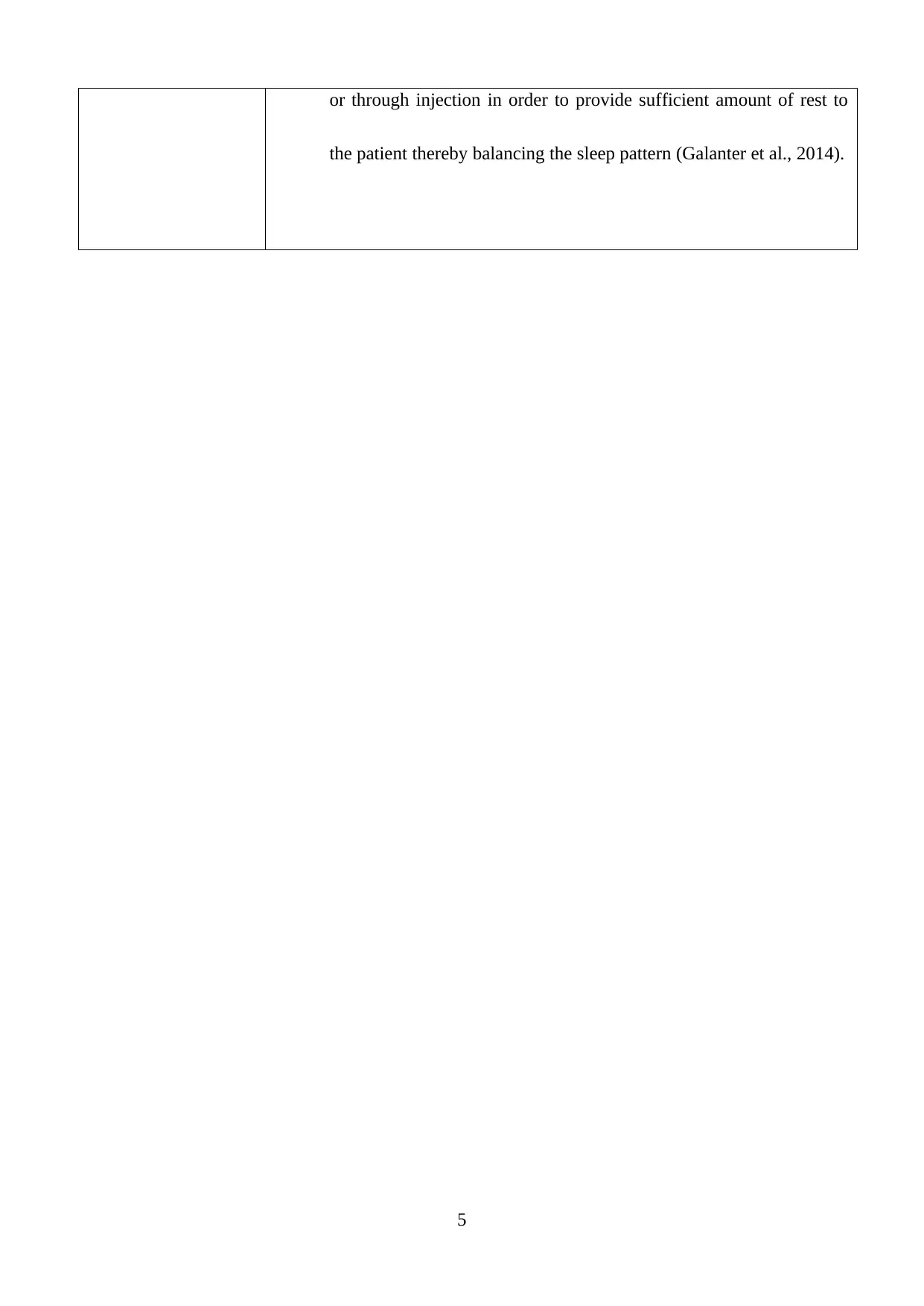
or through injection in order to provide sufficient amount of rest to
the patient thereby balancing the sleep pattern (Galanter et al., 2014).
5
the patient thereby balancing the sleep pattern (Galanter et al., 2014).
5

NURSING REPORT
6
6
⊘ This is a preview!⊘
Do you want full access?
Subscribe today to unlock all pages.

Trusted by 1+ million students worldwide
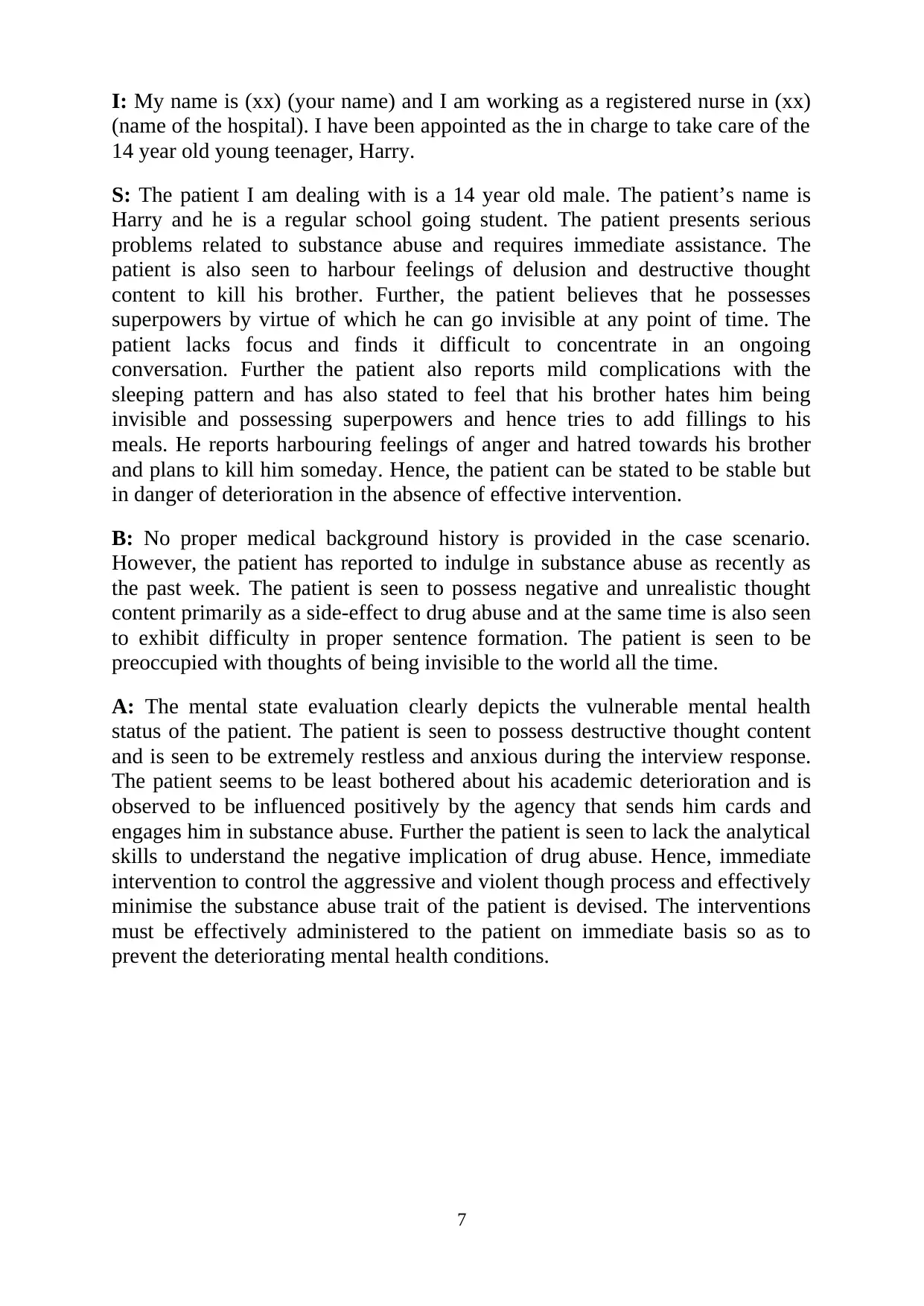
I: My name is (xx) (your name) and I am working as a registered nurse in (xx)
(name of the hospital). I have been appointed as the in charge to take care of the
14 year old young teenager, Harry.
S: The patient I am dealing with is a 14 year old male. The patient’s name is
Harry and he is a regular school going student. The patient presents serious
problems related to substance abuse and requires immediate assistance. The
patient is also seen to harbour feelings of delusion and destructive thought
content to kill his brother. Further, the patient believes that he possesses
superpowers by virtue of which he can go invisible at any point of time. The
patient lacks focus and finds it difficult to concentrate in an ongoing
conversation. Further the patient also reports mild complications with the
sleeping pattern and has also stated to feel that his brother hates him being
invisible and possessing superpowers and hence tries to add fillings to his
meals. He reports harbouring feelings of anger and hatred towards his brother
and plans to kill him someday. Hence, the patient can be stated to be stable but
in danger of deterioration in the absence of effective intervention.
B: No proper medical background history is provided in the case scenario.
However, the patient has reported to indulge in substance abuse as recently as
the past week. The patient is seen to possess negative and unrealistic thought
content primarily as a side-effect to drug abuse and at the same time is also seen
to exhibit difficulty in proper sentence formation. The patient is seen to be
preoccupied with thoughts of being invisible to the world all the time.
A: The mental state evaluation clearly depicts the vulnerable mental health
status of the patient. The patient is seen to possess destructive thought content
and is seen to be extremely restless and anxious during the interview response.
The patient seems to be least bothered about his academic deterioration and is
observed to be influenced positively by the agency that sends him cards and
engages him in substance abuse. Further the patient is seen to lack the analytical
skills to understand the negative implication of drug abuse. Hence, immediate
intervention to control the aggressive and violent though process and effectively
minimise the substance abuse trait of the patient is devised. The interventions
must be effectively administered to the patient on immediate basis so as to
prevent the deteriorating mental health conditions.
7
(name of the hospital). I have been appointed as the in charge to take care of the
14 year old young teenager, Harry.
S: The patient I am dealing with is a 14 year old male. The patient’s name is
Harry and he is a regular school going student. The patient presents serious
problems related to substance abuse and requires immediate assistance. The
patient is also seen to harbour feelings of delusion and destructive thought
content to kill his brother. Further, the patient believes that he possesses
superpowers by virtue of which he can go invisible at any point of time. The
patient lacks focus and finds it difficult to concentrate in an ongoing
conversation. Further the patient also reports mild complications with the
sleeping pattern and has also stated to feel that his brother hates him being
invisible and possessing superpowers and hence tries to add fillings to his
meals. He reports harbouring feelings of anger and hatred towards his brother
and plans to kill him someday. Hence, the patient can be stated to be stable but
in danger of deterioration in the absence of effective intervention.
B: No proper medical background history is provided in the case scenario.
However, the patient has reported to indulge in substance abuse as recently as
the past week. The patient is seen to possess negative and unrealistic thought
content primarily as a side-effect to drug abuse and at the same time is also seen
to exhibit difficulty in proper sentence formation. The patient is seen to be
preoccupied with thoughts of being invisible to the world all the time.
A: The mental state evaluation clearly depicts the vulnerable mental health
status of the patient. The patient is seen to possess destructive thought content
and is seen to be extremely restless and anxious during the interview response.
The patient seems to be least bothered about his academic deterioration and is
observed to be influenced positively by the agency that sends him cards and
engages him in substance abuse. Further the patient is seen to lack the analytical
skills to understand the negative implication of drug abuse. Hence, immediate
intervention to control the aggressive and violent though process and effectively
minimise the substance abuse trait of the patient is devised. The interventions
must be effectively administered to the patient on immediate basis so as to
prevent the deteriorating mental health conditions.
7
Paraphrase This Document
Need a fresh take? Get an instant paraphrase of this document with our AI Paraphraser
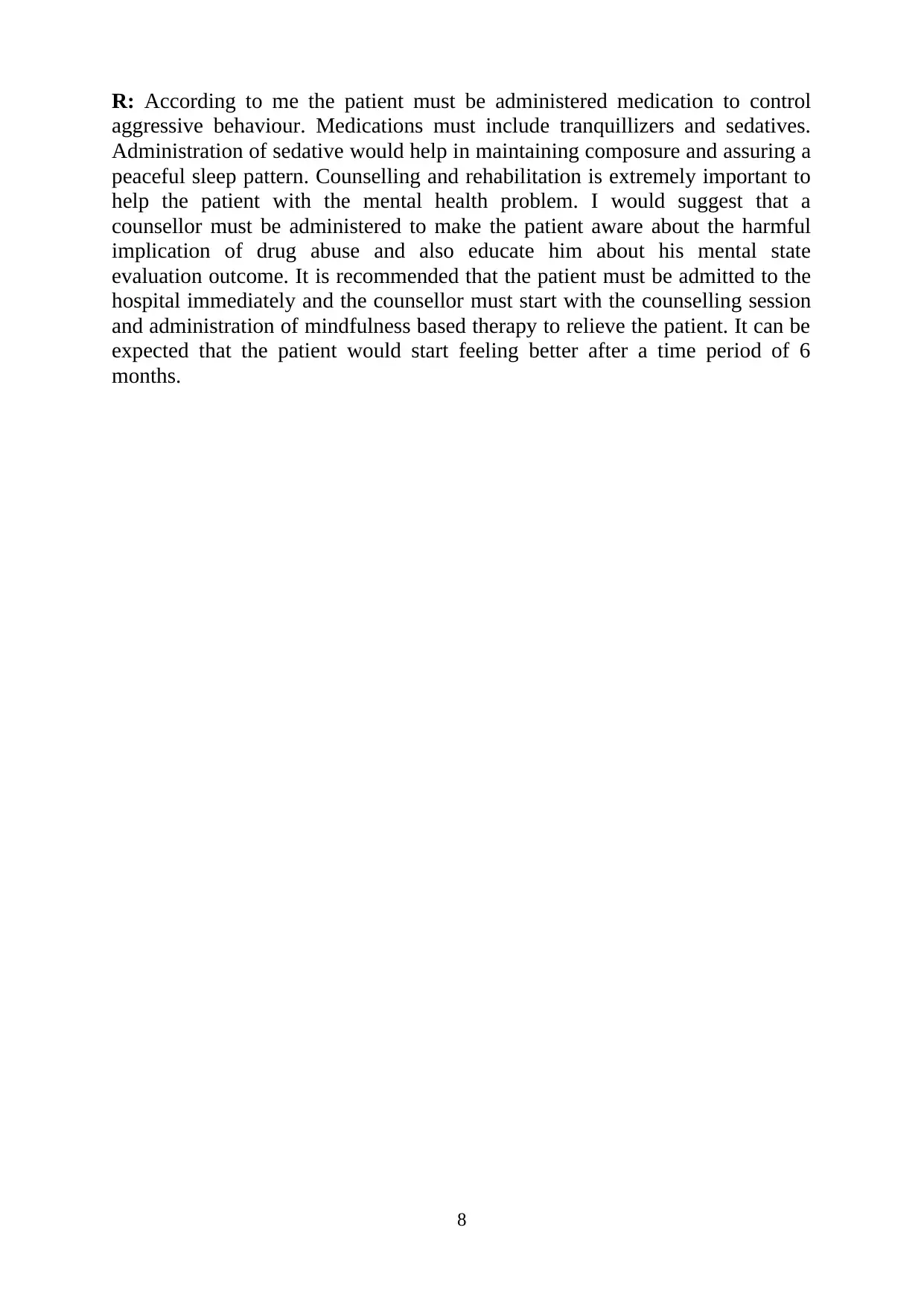
R: According to me the patient must be administered medication to control
aggressive behaviour. Medications must include tranquillizers and sedatives.
Administration of sedative would help in maintaining composure and assuring a
peaceful sleep pattern. Counselling and rehabilitation is extremely important to
help the patient with the mental health problem. I would suggest that a
counsellor must be administered to make the patient aware about the harmful
implication of drug abuse and also educate him about his mental state
evaluation outcome. It is recommended that the patient must be admitted to the
hospital immediately and the counsellor must start with the counselling session
and administration of mindfulness based therapy to relieve the patient. It can be
expected that the patient would start feeling better after a time period of 6
months.
8
aggressive behaviour. Medications must include tranquillizers and sedatives.
Administration of sedative would help in maintaining composure and assuring a
peaceful sleep pattern. Counselling and rehabilitation is extremely important to
help the patient with the mental health problem. I would suggest that a
counsellor must be administered to make the patient aware about the harmful
implication of drug abuse and also educate him about his mental state
evaluation outcome. It is recommended that the patient must be admitted to the
hospital immediately and the counsellor must start with the counselling session
and administration of mindfulness based therapy to relieve the patient. It can be
expected that the patient would start feeling better after a time period of 6
months.
8
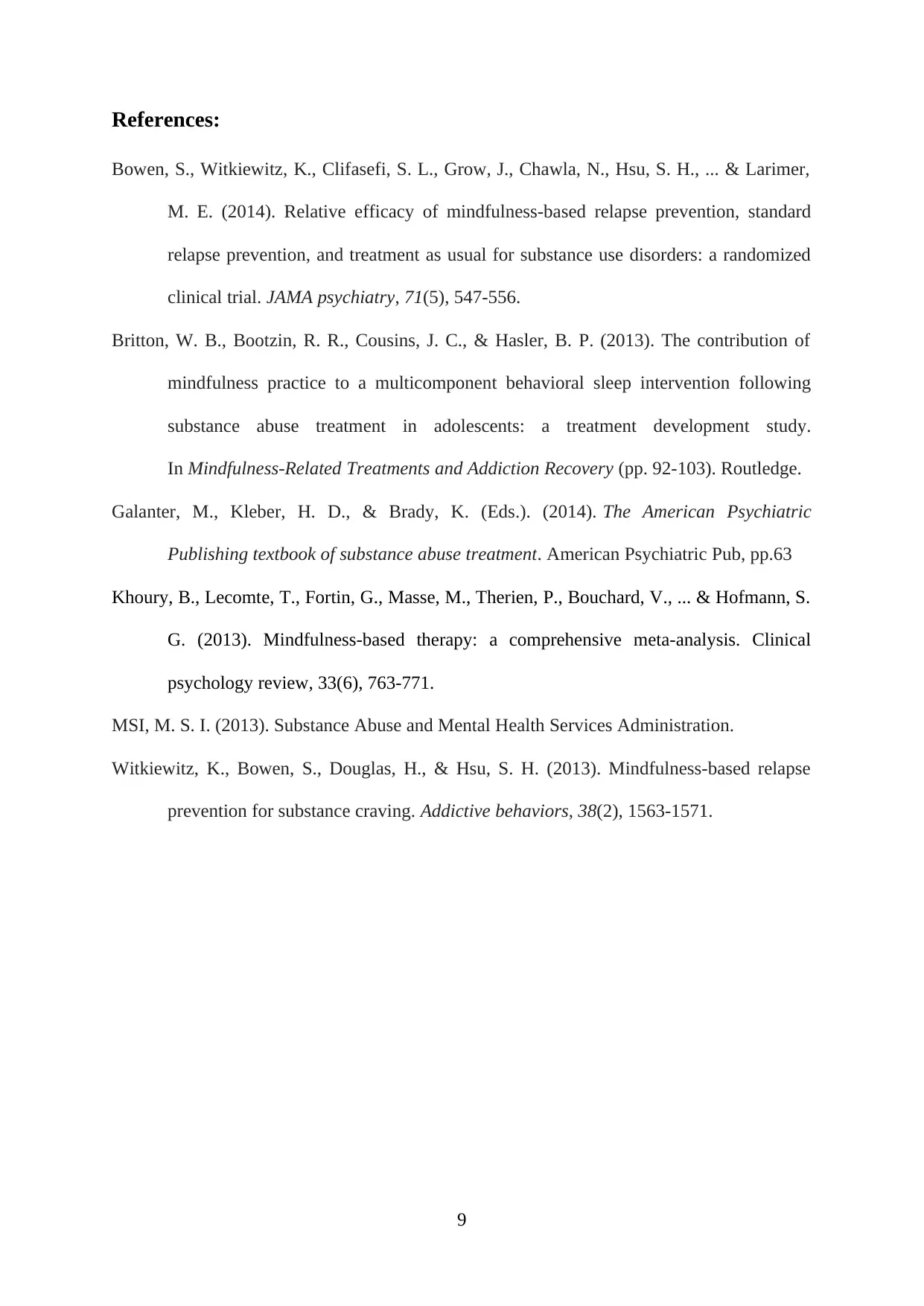
References:
Bowen, S., Witkiewitz, K., Clifasefi, S. L., Grow, J., Chawla, N., Hsu, S. H., ... & Larimer,
M. E. (2014). Relative efficacy of mindfulness-based relapse prevention, standard
relapse prevention, and treatment as usual for substance use disorders: a randomized
clinical trial. JAMA psychiatry, 71(5), 547-556.
Britton, W. B., Bootzin, R. R., Cousins, J. C., & Hasler, B. P. (2013). The contribution of
mindfulness practice to a multicomponent behavioral sleep intervention following
substance abuse treatment in adolescents: a treatment development study.
In Mindfulness-Related Treatments and Addiction Recovery (pp. 92-103). Routledge.
Galanter, M., Kleber, H. D., & Brady, K. (Eds.). (2014). The American Psychiatric
Publishing textbook of substance abuse treatment. American Psychiatric Pub, pp.63
Khoury, B., Lecomte, T., Fortin, G., Masse, M., Therien, P., Bouchard, V., ... & Hofmann, S.
G. (2013). Mindfulness-based therapy: a comprehensive meta-analysis. Clinical
psychology review, 33(6), 763-771.
MSI, M. S. I. (2013). Substance Abuse and Mental Health Services Administration.
Witkiewitz, K., Bowen, S., Douglas, H., & Hsu, S. H. (2013). Mindfulness-based relapse
prevention for substance craving. Addictive behaviors, 38(2), 1563-1571.
9
Bowen, S., Witkiewitz, K., Clifasefi, S. L., Grow, J., Chawla, N., Hsu, S. H., ... & Larimer,
M. E. (2014). Relative efficacy of mindfulness-based relapse prevention, standard
relapse prevention, and treatment as usual for substance use disorders: a randomized
clinical trial. JAMA psychiatry, 71(5), 547-556.
Britton, W. B., Bootzin, R. R., Cousins, J. C., & Hasler, B. P. (2013). The contribution of
mindfulness practice to a multicomponent behavioral sleep intervention following
substance abuse treatment in adolescents: a treatment development study.
In Mindfulness-Related Treatments and Addiction Recovery (pp. 92-103). Routledge.
Galanter, M., Kleber, H. D., & Brady, K. (Eds.). (2014). The American Psychiatric
Publishing textbook of substance abuse treatment. American Psychiatric Pub, pp.63
Khoury, B., Lecomte, T., Fortin, G., Masse, M., Therien, P., Bouchard, V., ... & Hofmann, S.
G. (2013). Mindfulness-based therapy: a comprehensive meta-analysis. Clinical
psychology review, 33(6), 763-771.
MSI, M. S. I. (2013). Substance Abuse and Mental Health Services Administration.
Witkiewitz, K., Bowen, S., Douglas, H., & Hsu, S. H. (2013). Mindfulness-based relapse
prevention for substance craving. Addictive behaviors, 38(2), 1563-1571.
9
⊘ This is a preview!⊘
Do you want full access?
Subscribe today to unlock all pages.

Trusted by 1+ million students worldwide
1 out of 9
Related Documents
Your All-in-One AI-Powered Toolkit for Academic Success.
+13062052269
info@desklib.com
Available 24*7 on WhatsApp / Email
![[object Object]](/_next/static/media/star-bottom.7253800d.svg)
Unlock your academic potential
Copyright © 2020–2026 A2Z Services. All Rights Reserved. Developed and managed by ZUCOL.





